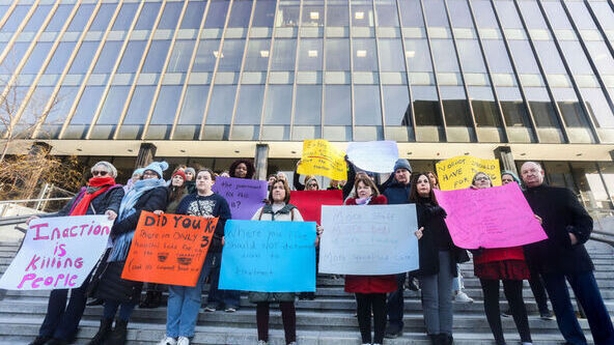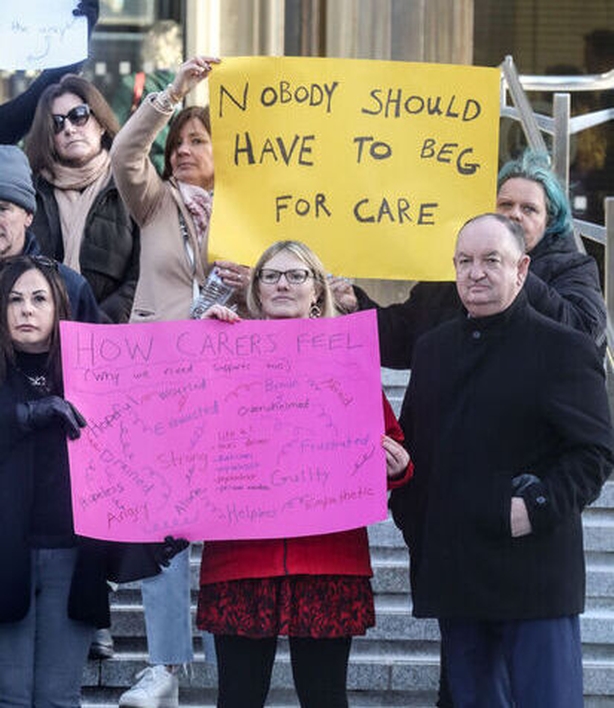The Government is "firmly committed" to enhancing specialist services for eating disorders, including improved access and shorter waiting lists, the Department of Health has said.
The statement comes after parents and campaigners protested outside the department this morning, highlighting the inadequate services available to those who need help.
Campaigners called on the Government to tackle the problem, which they said has been causing "distress and devastation" to individuals and their families.
Amy Hanley began the Mind EveryBody campaign group to seek urgent changes to how eating disorders are treated in Ireland.
She said: "Every step of the way we encountered a barrier.
"There was no connection in treatment services, with long waiting lists turning an initial concerning situation into a medical emergency."

She pointed out that the small number of eating disorder facilities available are largely catchment based.
Ms Hanley said: "If inpatient care is required and you don't live in the area of the facility, there is little to no treatment available.
"The back and forth between different facilities is detrimental to recovery, and many people are forced to obtain treatment abroad."
Earlier this year, the Health Research Board reported that the number of child and adolescent admissions for eating disorders had more than doubled in the last five years, from 33 in 2018 to 80 in 2022.
According to the HSE, eating disorders have the highest mortality and morbidity within mental health and they pose significant health, social and economic costs to people with eating disorders, to their families and to society.
Early intervention, evidence-based care and consistent support make a profound difference to the clinical and personal recovery of people who are affected by eating disorders, including those in adolescence when many eating disorders begin.
CARED Ireland is a voluntary support group for parents and carers of individuals suffering from eating disorders.
Spokesperson Susan Brennan described the current situation as "a national scandal and totally unacceptable".
She said the gravity of the issue could not be overstated.

In 2018, the HSE published a Model of Care plan for eating disorder services in Ireland.
Key recommendations included the development of a national network of dedicated eating disorder teams embedded within the mental health service, a stepped model of outpatient, day patient and inpatient care provision based on clinical need and the development of a skilled, trained workforce.
However, those who attended the protest today said services had worsened since the plan was published.
Today, there are fewer beds available and more people presenting with eating disorders.
In 2018, the HSE said that based on epidemiological projections, an estimated 188,895 people in Ireland would experience an eating disorder at some point in their lives.
It estimated that approximately 1,757 new cases occur in Ireland each year in the 10-49 age group.
At the moment, families and children seeking treatment have to contend with lengthy Child and Adolescent Mental Health Services waiting lists.
Children are then transferred between hospitals, inpatient facilities and community care.
All of this is making recovery very difficult, and families do not know where to turn.
Parents also pointed out that the medical approach is not working in all cases, that it needs to be more holistic.
HSE expresses 'deep regret'
The National Clinical Programme for Eating Disorders (NCPED) aims to establish an eating disorder network (eight adult teams and eight CAMHS teams) in accordance with the agreed Model of Care 2018.
Today, there are five CAMHS and five Adult National Clinical Programme for Eating Disorders (NCPED) teams at various stages of development according to the HSE.
The HSE has expressed deep regret that families and patients are finding that services are not of the standard required.
It acknowledged that this added "undue stress" to those affected and it was "working hard", in particular CAMHS services, to ensure patients receive the highest standard of care possible.
"While investment in CAMHS and youth mental health service improvement has grown over the past decade, we know improvements still need to be made and we are committed to making substantial changes and improvements in the mental health services provided in Ireland to children and adolescents," it said.
It added that its commitment to youth mental health service improvement was demonstrated through a newly established Child and Youth Mental Health Office.
The Department of Health said there was a firm commitment in Government to enhance specialist services for eating disorders, including improved access and shorter waiting lists.
It said a number of new posts would be made available through next year's mental health budget to support the provision and development of youth mental health services.
The posts will support eating disorders, dual diagnosis and early intervention psychosis according to the department.
Funding will also be used to ensure "the strategic development and alignment of key services" that are relied on by young people and their families, it said.
The department also pointed out that recruitment of dietitians remained a challenge, but it said that the Minister of State for Mental Health Butler had prioritised the continued implementation of the National Clinical Programme for Eating Disorders.






